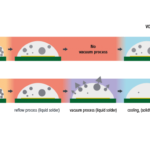It’s estimated that nearly 30% of people who try cannabis will go on to develop a substance use disorder associated with it. Strong predictors include how often a person uses it, and whether they have a family history of drug use.
Now, researchers have identified specific regions of the human genome connected to cannabis use, which means the propensity to get addicted to weed may be encoded in DNA.
That’s from a study conducted by scientists at the University of California San Diego (UCSD) School of Medicine working in the field of psychiatry, in partnership with genetic testing firm 23andMe. Nearly 132,000 participants from the latter’s platform opted into a survey about their cannabis use, along with volunteering their genetic data.
This type of study is known as a genome-wide association study (GWAS); it compares the DNA of thousands of people to find genetic variations that are more common in those with a particular trait or condition. It’s essentially a massive search across the entire human genome to spot which genetic differences might be linked to things like diseases, behaviors, or physical characteristics.
GWAS-based research has previously helped establish a causal link between gut bacteria and insomnia, find nearly 300 gene variants that contribute to developing major depressive disorder, and map the genetic blueprint that leads to age-related decline in resilience in people above age 65.
The paper, which appeared in the journal Molecular Psychiatry this week, points to two key genes that were linked to lifetime cannabis use, as well as a range of conditions. The first one, known as Cell Adhesion Molecule 2 (CADM2), has previously been linked to impulsive personality, obesity, and cancer metastasis.
The second gene, called Metabotropic Glutamate Receptor 3 (GRM3), has been linked to schizophrenia and bipolar disorder. Being linked to these conditions doesn’t mean that using cannabis will lead to these disorders, but simply that “some biological pathways may be in common” between them and cannabis use, noted study co-author Abraham A. Palmer.
A secondary analysis of the data revealed 40 more genes associated with lifetime cannabis use, and four genes associated with frequency of cannabis use.
“We showed that the genetics of cannabis use – both trying it and using it more often – are tied to the genetics of other psychiatric traits, cognitive measures, and even physical health problems,” said Sandra Sanchez-Roige, senior author of the study, underscoring the significance of these findings. “Understanding the genetics of early-stage behaviors may help clarify who is at greater risk, opening the door to prevention and intervention strategies.”
That’s important when you consider just how widely marijuana has proliferated across the US: it’s presently legal in 24 states, and according to a 2024 report from the Substance Abuse and Mental Health Services Administration (PDF), 20.6 million people in the country had developed marijuana use disorder (in which problematic use of the substance can cause significant impairment or distress), a slight increase from previous years. At the same time, there aren’t any FDA-approved drug therapies to treat cannabis use disorder.
While the findings don’t mean that the presence of these genes will inevitably cause the condition, understanding the genetic association and molecular systems that exist between our brains and our use of the substance could help identify people who might be more susceptible, and make help available to them earlier. “By studying these intermediate traits, we can begin to map how genetic risk unfolds before cannabis use disorder develops,” First author Hayley Thorpe from Western University noted.









